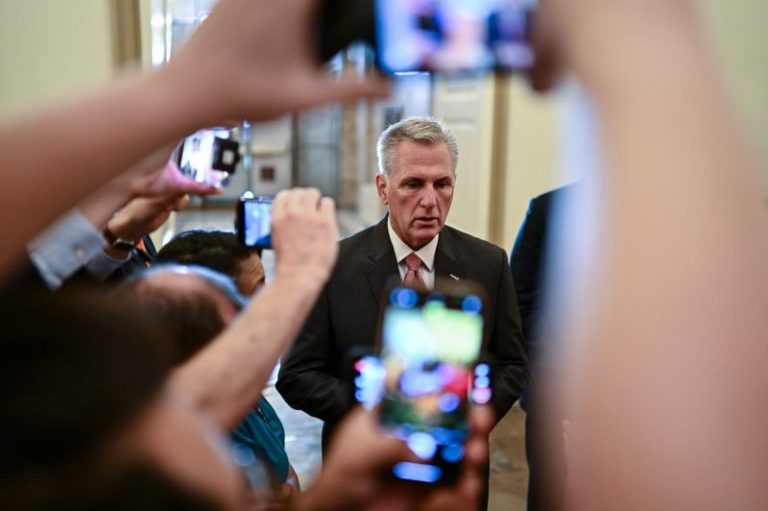Lawmakers are nearing a modest deal on overhauling the nation’s permitting process for energy projects as part of legislation to raise the debt ceiling and avert an unprecedented default, according to two people close to the deliberations.
The emerging deal would ease the process of building the interstate transmission lines needed to carry clean electricity across the country — a top priority for Democrats and a boon for President Biden’s climate agenda, said the two individuals, who spoke on the condition of anonymity to describe the private negotiations.
To sweeten the deal for Republicans, the agreement would make modest changes to the National Environmental Policy Act, a 1970 law that requires the federal government to analyze the environmental impact of its proposed actions. GOP lawmakers have long blamed the bedrock environmental law for the years-long delays that plague new highways, pipelines and other infrastructure projects nationwide.
The people close to the talks cautioned that lawmakers have not agreed to any final deal on energy permitting and that the contours of the emerging agreement could change in the fast-moving discussions.
What happens if the U.S doesn’t raise the debt ceiling?
End of carousel
The transmission proposal would be based on forthcoming legislation from Rep. Scott Peters (D-Calif.) and Sen. John Hickenlooper (D-Colo.) known as the Building Integrated Grids With Inter-Regional Energy Supply (Big Wires) Act. The measure seeks to encourage the construction of transmission lines by requiring regions to transfer at least 30 percent of their peak electricity demand between each other, according to a one-page summary obtained by The Washington Post.
The bill could help the United States reach Biden’s goal of net-zero emissions by 2050. To meet that target, energy experts say, the country needs to build more transmission lines to deliver clean electricity from far-flung wind and solar farms to urban centers.
Republicans made the initial push for permitting to be included in the debt ceiling bill, with the goal of including a permitting proposal from Rep. Garret Graves (R-La.), a top GOP negotiator. But the emerging deal would include only incremental changes sought by Graves and other Republicans, who have championed the expansion of pipelines and other fossil fuel projects.
Nor would the measure make more sweeping changes sought by some liberal Democrats, who have proposed giving the Federal Energy Regulatory Commission more authority over interstate transmission lines. Many Republicans have objected to that proposal, saying it would trample on states’ rights.
“A lot of Democrats think if there’s any deal around permitting reform, transmission has got to be part of it,” Peters told reporters Thursday.
“So this was just a suggestion we made as one way to deal with transmission,” he added. “It doesn’t answer all of the transmission questions.”
Peters, a moderate Democrat from fire-prone California, has partnered with House Speaker Kevin McCarthy (R-Calif.) on separate legislation aimed at accelerating the permitting process for fire-prevention activities and saving the state’s giant sequoias. Peters declined to say whether he had discussed the emerging permitting deal with the speaker.
The White House unveiled its own permitting priorities this month, including accelerating the expansion of transmission lines and renewable energy projects on federal lands. White House climate adviser John D. Podesta has also said Biden supports permitting legislation from Sen. Joe Manchin III (D-W.Va.) that would set two-year time limits on environmental reviews of major projects and expedite the Mountain Valley natural gas pipeline.
“We’ve been clear we support permitting reform, with Senior Advisor John Podesta outlining our priorities earlier this month,” White House spokesman Michael Kikukawa said in an email. “We have seen bipartisan support for permitting reform and certainly hope there is bipartisan progress. But we’re not going to detail what negotiators are discussing.”
Permitting is far from the only outstanding issue in the debt ceiling negotiations. With eight days until the government could run out of money, Republicans have continued to press for a range of concessions from the White House, including increased spending on the military and funding cuts for domestic programs.

